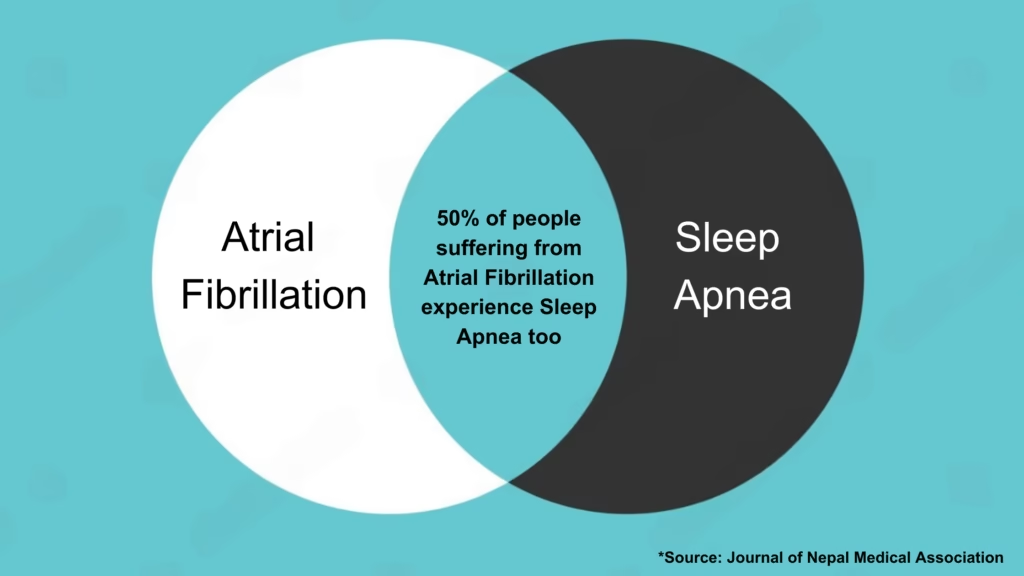Your heart beats about 100,000 times a day. That’s roughly 35 million diastoles in one calendar year. But what happens when it doesn’t?
You are attending a business conference or simply trying to sleep under the duvet with your eyes closed, and suddenly you feel it– a flutter, a pause, a heart thump. For a split second, it seems like your heart skipped a beat and is out of control. You begin to panic. Is this normal? Should you be worried? Is it arrhythmia/palpitation?
Occasional skipped beats are a normal occurrence and are known to happen to almost everyone. But if they appear too often or start causing dizziness, chest pain, or fatigue, they can be a warning sign of something deeper than mere discomfort. With millions experiencing arrhythmias ‘irregular heartbeats’, it is concerning that many go unnoticed until they spiral into complex life-threatening situations. With the rise in heart attacks at a young age, it is more important than ever to never ignore any suspicious feeling in the heart and book a heart check-up for early detection. When recognized early, any dangerous condition can be prevented in the future with the help of SAAOL’s non-invasive treatment.
What is even more worrisome? Some of the triggers for those ‘skips’ are things you would never expect; your subconscious, your gut health maybe, a hidden magnesium deficiency, or even how you slept last night. The truth is, your heart is extremely sensitive – far beyond just stress and caffeine.
In this post, SAAOL Heartcare Delhi helps you to understand the phenomenon behind your heart skipping a beat. By the end, you would have answers to relevant questions and most importantly, know how to protect your heart long term. So if you are health conscious, a working individual, or trying to understand an unsought symptom – this guide is for you.
Table of Contents
ToggleWhat Does “Heart Skipping a Beat” Actually Mean?
First and foremost, let us understand the science of it all. Why does your heart skip a beat, and what is your heart trying to communicate?
The feeling of forced muscles moving can best be defined as:
- Fluttering or thumping in the chest
- Pause followed by a stronger beat
- Feeling of your heart racing or flipping over

When the heart is more active than it needs to be, it feels like it is not beating in a preferred manner. Instead, two cases can describe the condition.
Premature Contractions: These heartbeats are early in timing and occur in either the atria (upper chambers) or ventricles (lower chambers). Such early beats disrupt the regular pacing, which leads to an impression of a “pause” followed by a stronger heartbeat.
Arrhythmia: A malfunction in the normal electrical activity of the heart, resulting in an abnormal heart rate pattern, whether too fast or too slow.
Hidden Causes of Heart Palpitations
An odd skipped heartbeat now and then is generally harmless, but if it happens too frequently and persistently, it can indicate there is a problem within the body. The reasons are multiple and some of them might shock you.
Caffeine and Stimulants: More Than Just a Coffee Buzz
It is common knowledge that caffeine can accelerate your heart rate. To add on, do you know that it can also induce premature contractions? Even energy drinks, particular teas, and some non-prescription medicines such as decongestants can lead to the overstimulation of the pathways in the heart leading to irregular and sporadic heartbeats.
Some people have diverse chances in caffeine metabolism that make them more sensitive to caffeine. If you fall under this bracket, having the third cup of coffee could make your heart go overboard.
-
Unnoticed Deficiency in nutrition
Electrolytes mostly potassium, magnesium, and calcium work together for proper systematic heart functioning. Lack of any one of them results in the heart construction and pumping malfunctioning which can even lead to arrhythmias.
Did you know? Magnesium deficiency can lead to abnormal heart rhythms. This can mainly occur in older people due to stress, alcohol, and while using other medications like diuretics, which leads the heart to a more vulnerable state.
Undiagnosed Sleep Problems
Feeling lethargic after sleeping for a complete night? It goes beyond insomnia. Sleep Apnea is a condition in which breathing stops multiple times during sleep, to great lengths affecting the heart. The body experiences a decrease in oxygen which can be dangerous and lead to an irregular heartbeat. Sleep Apnea and Atrial Fibrillation are linked, as researches show that 50% of people suffering from Atrial Fibrillation experience Sleep Apnea too, but don’t know yet.

Thyroid Problems
Regarding heart rate, most of the time the thyroid gland plays an important part in controlling it. An overworking thyroid or even imbalances of the organ can lead to the heart getting overstimulated causing an irregular heartbeat.
The risk that is not commonly known: Palpitations after giving birth for some mothers are attributed to Postpartum Thyroiditis, which is thyroid inflammation that occurs after giving birth.
Gut-Heart Connection
Emerging research shows that your gut microbiome—those trillions of bacteria in your digestive system—can influence your heart’s rhythm. An imbalance in gut bacteria can trigger systemic inflammation, which may affect the electrical activity of the heart.
The Wild Card: Certain probiotics have been shown to reduce heart inflammation and improve arrhythmia symptoms. Could the future of heart health be in your gut?
Emotional and Psychological Stress
We often associate stress with headaches or tension, but it’s also a common trigger for skipped heartbeats. Stress hormones like adrenaline and cortisol can overstimulate the heart, causing palpitations. Chronic stress doesn’t just trigger arrhythmias; it rewires your brain-heart axis, making your heart more susceptible to future irregularities.
The Warning Signs of Arrhythmia to Watch For
Not all skipped beats are equal. While occasional palpitations are often harmless, certain symptoms should prompt immediate medical attention:
- Chest Pain or Discomfort – These sensations are indicative of a heart attack waiting to happen because there is a possible lack of oxygen to the heart.
- Shortness of Breath – A person experiencing shortness of breath alongside difficult breathing and irregular heart sounds is at risk of heart failure or heart problems.
- Dizziness or Fainting – Lightheadedness is likely indicative of arrhythmia like fainting because of insufficient circulation due to the heart working poorly.
- Rapid, Prolonged Heart Rate – It is one of the arrhythmias that need intervention where the heart pumps at a much higher speed than normal owing to activity making it hard for the individual to slow it down mega tachycardia or prolonged rapid heart rate.
Decoding a Doctor Visit For Skipped Heartbeats?
If you visited a doctor complaining of skipped beats, odds are you’d begin with some tests designed to uncover heart rhythm irregularities.
- Electrocardiogram (ECG): This allows for a real-time recording of the electrical activity of the heart.
- Holter Monitor: This portable device records the heart rhythm for a longer period of 24 to 48 hours.
- Echocardiogram: An ultrasound of the heart aimed at identifying potential problems.
Can Skipped Beats Be Prevented? Absolutely!
Even if you’ve experienced palpitations, there’s a lot you can do to prevent future episodes:
Optimize Nutrition
Source: Eat more magnesium-rich foods, such as spinach. Stay hydrated and equilibrate with potassium-rich fruits such as bananas and oranges.
Manage Stress
Include stress-reduction activities such as yoga, meditation, or breathing exercises to manage your adrenaline levels.
Prioritize Sleep
See a specialist if you think you may have a sleep disorder. Much of sleep apnea can be dramatically improved with simple fixes, such as sleeping on your side or wearing a CPAP machine.
Avoid Stimulants
Limit caffeine, alcohol, and nicotine. If you’re sensitive to stimulants, even decaf coffee can be a better choice.
Busting the Myths Around Heart Skips
Myth: My skipped beats are always dangerous.
Fact: Occasional palpitations are usually benign. However, episodes that are frequent or persistent need evaluation by a doctor.
Myth: Arrhythmias are found solely in older adults.
Fact: Stress, sleep disorders, and lifestyle habits render young adults equally vulnerable.
Myth: Arrhythmias cannot be cured.
Fact: Many arrhythmias can be managed through lifestyle changes, drugs, or minimally invasive procedures such as ablation and EECP treatment in Delhi/NCR.
The Bigger Picture: Your Heart’s Whisper
When your heart races, it’s not just a moment—it’s a signal, a nudge that something within you might need some attention. If it’s stress, nutrition, or an underlying condition, listening to your heart will save you from larger issues down the line. With SAAOL Delhi services, you can consult for the treatment of all these conditions with India’s pioneered non-invasive heart treatment by Dr. Bimal Chhajer.
The next time you experience that flutter in your chest — don’t wave it away. Take a moment to reflect on your lifestyle, your stress levels, and your overall health. Sometimes, even the smallest symptoms are the start of a story your heart is trying to tell.
Conclusion
Your heart isn’t just a pump — it’s a dynamic, responsive organ, reacting to everything from your emotions to your environment. Skipped beats can be a harmless quirk and a warning sign. Gaining an understanding of the science, tuning into your body — and then adjusting your health decisions accordingly — can allow your heart to keep on beating strong, steady, and healthy for years to come.
Together we can retell the story of the healthy heart — one beat at a time.


